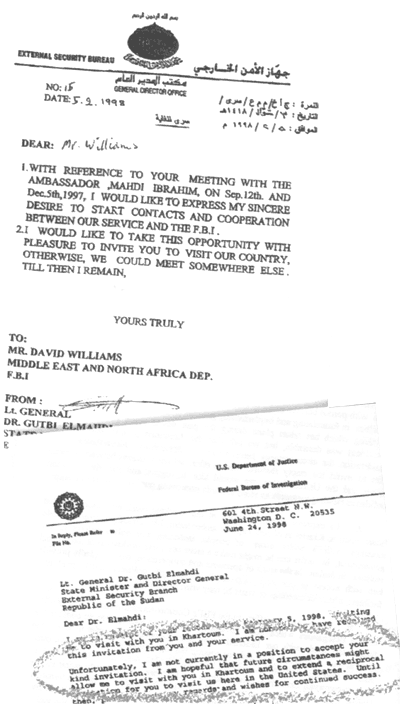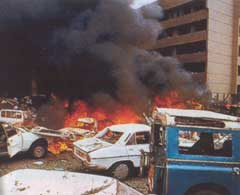| |
| © VANITY FAIR |
 |
There were still a few twists of this bitter farce to come.
A few days after the bombings, as NBC first reported in
1999, Sudan arrested two suspects who had arrived in Khartoum
from Kenya. They were carrying Pakistani passports and using
the names Sayyid Nazir Abbass and Sayyid Iskandar Suliman.
They had rented an apartment overlooking the U.S. Embassy
in Khartoum and appeared to be reconnoitring it for a possible
future attack. The material gathered between 1991 and 1996
led the Mukhabarat to believe that the two men were members
of al-Qaeda; what is certain is that they had stayed in
the Hilltop Hotel in Nairobi-the base used by other members
of the embassy-bombings conspiracy. The Mukha-barat cabled
the F.B.I. in Washington, offering to extradite them. Without
consulting the F.B.I., the U.S. Departments of State and
Defense replied by bombing the al-Shifa factory in Khartoum,
claiming-on the basis of what is now acknowledged to have
been yet more faulty intelligence-that it was owned by bin
Laden and was making VX nerve gas. In fact, al-Shifa had
no connection to bin Laden. It made vaccines and medicine,
and had contracts with the U.N.
U.S.-Sudan relations then reached their nadir. The Mukhabarat
sent the suspects "Abbass" and "Suliman"
to Pakistan, where they were promptly lost to view. Ambassador
Mohamed f was withdrawn from Washington. Just before his departure,
Janet McElligott arranged a meeting at her home between him
and a senior F.B.I. official. McElligott says the F.B.I. man
expressed his deep regret for what had happened and said he
hoped that in time the politicians would allow his agency
to examine the Sudanese intelligence.
|
 |
 |
 |
 |
 |
|
THE
PAPER TRAIL
(Right) Sudanese intelligence head
Gutbi al-Mahdi's letter to David Williams
of F.B.I; the bombing of the U.S.
Embassy in Kenya.
(Right below) William's reply to al-Mahdi's
letter.
|
|
|
 |
A few months later, in yet another
attempt to induce a thaw, the Mukhabarat chief,
Gutbi al-Mahdi, invited McElligott to Khartoum.
He gave her a hand-written note, which she delivered
to the office of the then F.B.I. director, Louis
Freeh. It related the circumstances of the two suspects'
arrest and the offer to send them to America, adding,
"The bombardment of the pharmaceutical factory
blew up the link we established with the F.B.I.
and the co-operation that developed on the situation."
However, their interrogation had revealed "some
information," and, as McEIligott reminded the
F.B.I., the Mukha-barat al-Qaeda files still awaited
inspection. Through McElligott, the F.B.I. tentatively
suggested a meeting with al-Mahdi in Europe. Before
it could take place, the State Department vetoed
it.
In Sudan, the ongoing U.S. attitude produced bewilderment.
"We felt it was an irrational attitude,"
al-Mahdi says. "We were extending our hand
to some- one who badly needed help, for our mutual
benefit, and it was being |
|
|
 |
|
rejected." He goes on to echo the claim made by Ambassador
Carney: "If [the F.B.I.] had taken up my offer in February
1998, they could have prevented the bombings.
They had very little information at that time: they were
shooting in the dark. Had they engaged with the Sudan, they
could have stopped a lot of things." It is hard to conceive
of a more serious allegation, and it appears to stand up to
scrutiny. As late as the end of 1995, Osama bin Laden was
not judged important enough by the C.I.A. or F.B.I. for anyone
to mention him to Ambassador Petterson when he went to talk
to the Sudanese about terrorism. It seems reasonable to infer
that the U.S. knew little about his organization or lethal
capability. Yet the Mukhabarat had all the main players taped.
Besides bin Laden and al-Zawahiri, there was Muhammad Atef,
said to be al-Qaeda's military commander, the man who seems
to have orchestrated the 1998 bombings and, reportedly, the
September II attacks. (In November, Atef was reportedly killed
in Afghanistan.) Every time Abu Ibrahim, bin Laden's former
C.E.O" visited his Khartoum home, Atef was there: Ibrahim
also recalls seeing Atef "with Osama in Afghanistan,
by his side when he delivers his messages on TV.
How useful might the files on them have been? Sitting by
the pool at the Khartoum Hilton, I asked a senior officer
from Egyptian intelligence, who has worked closely with the
Mukhabarat, and who asked not to be named. He said, "They
knew all about them: who they were, where they came from.
They had copies of their passports, their tickets; they knew
where they went. Of course that information could have helped
enormously. It is the history of those people." There
are also some inescapable specifics. During the New York trial
of the four men recently convicted of the 1998 bombings, the
court heard a lot about a man called Fazul Abdullah Mohammed,
who also appears on the most-wanted list. He set the embassy
plot rolling by making two journeys to Nairobi in the spring
of 1998-from Khartoum, where, the Mukhabarat believed, he
was working for al-Qaeda. If F.B.I. officials had accepted
the offer made by al-Mahdi that February, they would have
known this too, and at some point during his subsequent murderous
odyssey, when he rented a villa in Kenya, gathered the bombers
at the Hilltop Hotel, or helped stuff a pickup truck with
TNT, they might have stepped in and smashed the conspiracy.
The Mukhabarat also kept files on another wanted embassy bomber,
the Egyptian Saif al-Adel, who also appears on the list of
most wanted. He is believed to be in Afghanistan.
If the 1998 plot had been foiled, per- haps there would have
been no September II. In any event, Sudan had other intelligence
that would have made al-Qaeda's burgeoning growth less likely.
Wadih al-Hage, bin Laden's former private secretary, now serving
life without parole after his conviction in New York for his
role in the 1998 embassy bombings, was logged and photographed
in Sudan. He is said to have moved among bin Laden cells across
four continents. How much easier it might have been to cramp
al-Qaeda's style had his importance been grasped in 1996.
Another subject of a Mukhabarat file is Mamdouh Mahmoud Salim,
a Sudanese born to Iraqi parents, an Afghan-war veteran who
worked for two bin Laden companies in Sudan until 1995. He
provides a link with the New York suicide hijackers. From
1995 until 1998, he made frequent visits to Germany, where
a Syrian trader, Mamoun Darkazanli, had signing powers over
his bank account. Darkazanli has been reported to have procured
electronic equipment for al-Qaeda. Both men attended the same
Hamburg mosque as Mohamed Atta and Marwan al-Shehhi, who flew
the two planes into the World Trade Center.
|
 |
|
|
 |
|
It was not until May 2000 that the Clinton administration
responded to pressure from the US intelligence community and
agreed to send a joint F.B.I.- C.I.A. team to Sudan.
Even then its mission was not to examine the Mukhabarat files
but to ascertain whether Sudan was really sponsoring terror.
In the summer of 2001 the team gave the country a clean bill
of health. There were no "training camps" or sanctuaries
for murderers after all. Gutbi al-Mahdi, the former Mukhabarat
chief, says that a few weeks before September 11 the American
team finally asked to examine the Sudanese material on al-Qaeda.
Events suggest that by then it was too late.
There are uncomfortable historical parallels. By the spring
of 1941 the Soviet Union's "Red Orchestra" spy ring
had been warning Stalin for months that Nazi Germany was about
to break its pact with the Soviet Union and invade. Convinced
that Hitler remained his ally, he ignored them, so that when
the Nazi troop trains began to roll, and the dive-bombers
began their deadly blitzkrieg, they found themselves attacking
an almost undefended country. Leopold Trepper, the spy ring's
leader, wrote an autobiography, published after 20 million
Soviets had died in the Second World War:
"He who closes his eyes sees nothing, even in the full
light of day. ...The generalissimo preferred to trust his
political instinct rather than the secret reports piled up
on his desk." "He who closes his eyes sees nothing."
In the case of Sudan, 1996 through 2000, Madeleine Albright
and her assistant secretary for Africa, Susan Rice, apparently
preferred to trust their instincts that Sudan was America's
enemy, and so refused to countenance its assistance against
the deepest threat to U.S. security since 1945. Ambassador
Carney quoted Talleyrand, the 18th-century father of modern
diplomacy. This saga was "pire qu'un crime, c'etait une
betise." He provided his own translation. "It was
worse than a crime. It was a fuckup."
|
 |
|
<< back
|

|
 |
|
|
 |


